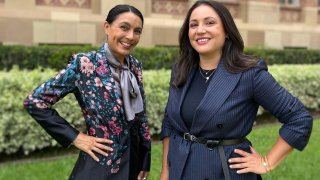
Two women and UCLA are joining together to create Latina Futures, 2050 Lab, a project to support research, collect and analyze data, and provide insights on the experiences of Latinas across the country and policies that affect their lives, it was announced by UCLA.
Veronica Terriquez, director of UCLA's Chicano Studies Research Center, said Latinas and other women of color have dealt with economic, social, political and health crises disproportionately, and their needs have been overlooked by policymakers. She is collaborating with Sonja Diaz, founding director of the Latino Policy & Politics Institute, on the project at UCLA.
The lab, launched with $15 million from the California state budget through efforts from the California Latino Legislative Caucus, will provide data and research focusing on how Latinas contribute to the nation's laws and policy debates.
One of the first areas of study for the 2050 Lab will be producing an anthology on the state of Latinas in education, civil society and the labor market. The anthology, to be published by the Chicano Studies Research Center's press, will provide an agenda for Latinas who are expected to make up 13% of the U.S. population and account for 11% of the labor force by 2050.
Get Southern California news, weather forecasts and entertainment stories to your inbox. Sign up for NBC LA newsletters.
"By building on the canon of our scholarly predecessors, we seek to produce cutting-edge research, elevate new voices and deepen community partnerships,'' Terriquez said in a statement. "Ultimately, we aim to inform action and track progress towards achieving more equitable and inclusive institutions where Latinas can thrive.''
Education, healthcare and other areas affected by COVID-19 revealed immense health disparities that persist in Latino communities in the United States, and Diaz said it creates a need for dialogue between Latina academics and politicians.
Latinas were left negatively affected by the pandemic both physically and financially.
Local
Get Los Angeles's latest local news on crime, entertainment, weather, schools, COVID, cost of living and more. Here's your go-to source for today's LA news.
"Latinos have been at a high risk of hospitalization or death from COVID 19 than some other racial or ethnic groups in the US", according to research done by the U.S Center for Disease Control and Prevention.
Most Latino families, including latinas, did not have a savings to fall back on during the pandemic and were left struggling to pay bills.
According to a report done by the Pew Reserarch Center done in 2020, about six-in-ten Latinos (59%) in May said they live in households that have experienced job losses or pay cuts due to the coronavirus outbreak, with a far lower share of U.S. adults (43%) saying the same.
Latinas have also seen an increase in receiving college degrees yet are still apart of the group facing the most challenges with student debt.
"Black women and Latina borrowers typically have higher student loan balances than white women, making repayment more difficult," according to a report by the Center for Responsible Lending.
Latinas have seen the result of how the pandemic has worsened the wage gap, making it harder to survive and pay off student loans.
"Latina women working full-time, year-round face typical lifetime losses that total over $1.1 million, for Native American women working full time, year-round it is nearly $1.1 million, and for Black women working full time, year-round, it is nearly $1 million. This makes it impossible for Latina, Native American, and Black women to ever catch up," according to a report done by the National Women's Law Center.
Latina, and women of color have suffered the most from the pandemic and are still continuing to deal with the aftermath.
"Latinas have shouldered the heaviest burden during this pandemic, yet they have remained invisible, disposable and inconsequential at decision- making tables,'' Diaz said. "This is not only bad for children and families, but for all Americans.''



